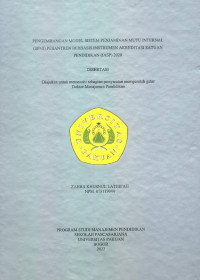Disertasi MP
Pengembangan Model System Penjaminan Mutu Internal (SPMI) Pesantren Berbasis Instrumen Akreditasi Satuan Pendidikan (IASP) 2022.
This study aims to develop an Instrument-based Islamic Boarding School SPMI model and determine the quality of product feasibility, namely the IASP2020 based Islamic Boarding School SPMI model. This study uses a Research and Development (R&D) approach by adapting the Borg and Gall models. Observation, interviews, and documentation obtained the collected data. The collected data was obtained through observation, discussions, and documentation methods. The data analysis used is qualitative and quantitative. Qualitative data analysis used the interactive model of Miles and Huberman through data reduction, data
presentation, and concluding. Quantitative data analysis was used to analyze the data collected from the questionnaire in the form of descriptive data analysis to get an overview of the developed model. The technique of checking the validity of the data is done through source and method triangulation. This study resulted in several findings: 1) The education quality assurance system implemented by Islamic boarding schools currently cannot be said to be concrete, comprehensive, systemic and sustainable; 2) Some of the obstacles faced by Islamic boarding schools with the existing quality assurance system are: a) the community council
has not yet been formed; b) system implementation is not optimal because there are no supporting devices; c) socialization has not been comprehensive; d) there is no guide for the preparation of SPMI Pesantren; e) the existing SPMI has not adopted the values of local wisdom of pesantren, 3) the model of SPMI Pesantren developed refers to the IASP2020, and is developed with a quality scheme in four main areas, namely, the quality of graduates, the learning process, the quality of Asatidz and pesantren management; 4) the stages of developing the SPMI model include: a) the formation of a community council; b) formulation of internal quality policy; c) quality mapping; d) quality compliance plan; e) quality implementation; f) monitoring and evaluation; g) determination of quality, 5) on the aspects of feasibility and effectiveness of the model obtained a score of 2.173 with an average
value of 4.18, which means it is reasonable and feasible to use. The questionnaire on user responses to the SPMI guidebook met the eligibility criteria in the aspects of the physical suitability of the guide, cover, letters, content, and language, with a total score of 514 and an average of 4.39.
Ketersediaan
Informasi Detail
- Judul Seri
-
-
- No. Panggil
-
35/LAT/D-MP/2022
- Penerbit
- Bogor : SPS Unpak., 2022
- Deskripsi Fisik
-
ix, 337 hlm : ilus ; 29 cm
- Bahasa
-
Indonesia
- ISBN/ISSN
-
-
- Klasifikasi
-
35/LAT/D-MP/2022
- Tipe Isi
-
-
- Tipe Media
-
-
- Tipe Pembawa
-
-
- Edisi
-
-
- Subjek
- Info Detail Spesifik
-
-
- Pernyataan Tanggungjawab
-
Prof. Dr. Sri Setyaningsih, M.Si. Dan Dr. Dian Wulandari, S.Psi..,M.Pd.
Versi lain/terkait
Tidak tersedia versi lain
Lampiran Berkas
Komentar
Anda harus masuk sebelum memberikan komentar

 Karya Umum
Karya Umum  Filsafat
Filsafat  Agama
Agama  Ilmu-ilmu Sosial
Ilmu-ilmu Sosial  Bahasa
Bahasa  Ilmu-ilmu Murni
Ilmu-ilmu Murni  Ilmu-ilmu Terapan
Ilmu-ilmu Terapan  Kesenian, Hiburan, dan Olahraga
Kesenian, Hiburan, dan Olahraga  Kesusastraan
Kesusastraan  Geografi dan Sejarah
Geografi dan Sejarah